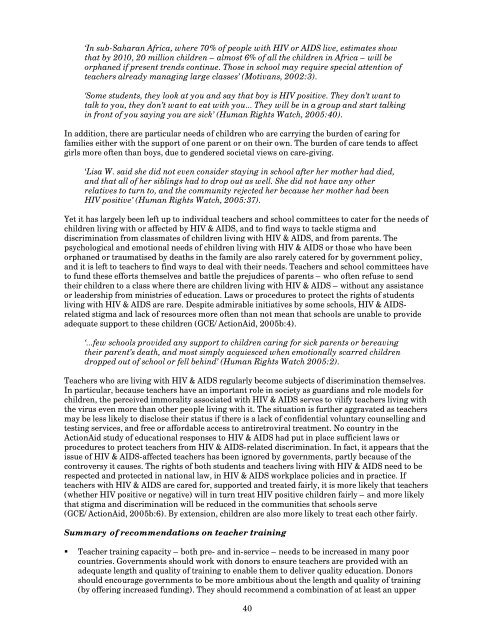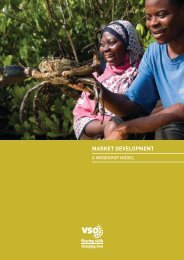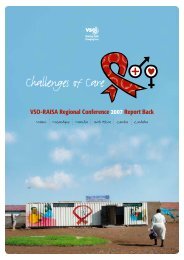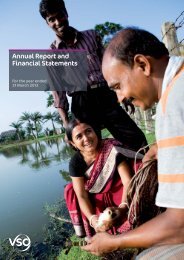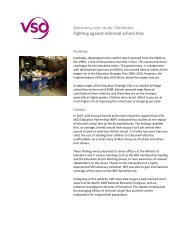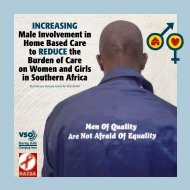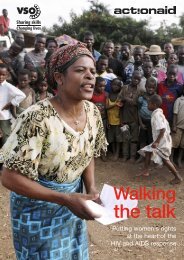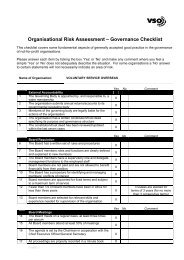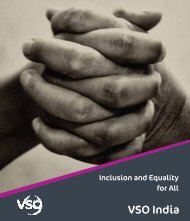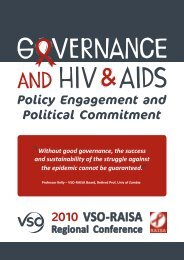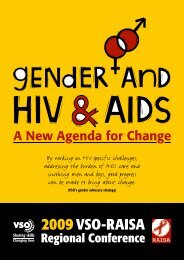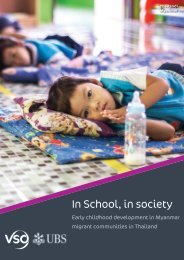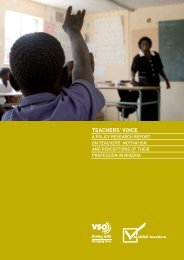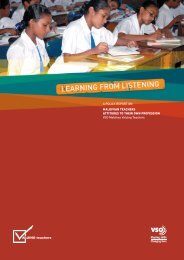Teachers for All â GCE policy briefing (566KB) - VSO
Teachers for All â GCE policy briefing (566KB) - VSO
Teachers for All â GCE policy briefing (566KB) - VSO
Create successful ePaper yourself
Turn your PDF publications into a flip-book with our unique Google optimized e-Paper software.
‘In sub-Saharan Africa, where 70% of people with HIV or AIDS live, estimates showthat by 2010, 20 million children – almost 6% of all the children in Africa – will beorphaned if present trends continue. Those in school may require special attention ofteachers already managing large classes’ (Motivans, 2002:3).‘Some students, they look at you and say that boy is HIV positive. They don’t want totalk to you, they don’t want to eat with you… They will be in a group and start talkingin front of you saying you are sick’ (Human Rights Watch, 2005:40).In addition, there are particular needs of children who are carrying the burden of caring <strong>for</strong>families either with the support of one parent or on their own. The burden of care tends to affectgirls more often than boys, due to gendered societal views on care-giving.‘Lisa W. said she did not even consider staying in school after her mother had died,and that all of her siblings had to drop out as well. She did not have any otherrelatives to turn to, and the community rejected her because her mother had beenHIV positive’ (Human Rights Watch, 2005:37).Yet it has largely been left up to individual teachers and school committees to cater <strong>for</strong> the needs ofchildren living with or affected by HIV & AIDS, and to find ways to tackle stigma anddiscrimination from classmates of children living with HIV & AIDS, and from parents. Thepsychological and emotional needs of children living with HIV & AIDS or those who have beenorphaned or traumatised by deaths in the family are also rarely catered <strong>for</strong> by government <strong>policy</strong>,and it is left to teachers to find ways to deal with their needs. <strong>Teachers</strong> and school committees haveto fund these ef<strong>for</strong>ts themselves and battle the prejudices of parents – who often refuse to sendtheir children to a class where there are children living with HIV & AIDS – without any assistanceor leadership from ministries of education. Laws or procedures to protect the rights of studentsliving with HIV & AIDS are rare. Despite admirable initiatives by some schools, HIV & AIDSrelatedstigma and lack of resources more often than not mean that schools are unable to provideadequate support to these children (<strong>GCE</strong>/ActionAid, 2005b:4).‘…few schools provided any support to children caring <strong>for</strong> sick parents or bereavingtheir parent’s death, and most simply acquiesced when emotionally scarred childrendropped out of school or fell behind’ (Human Rights Watch 2005:2).<strong>Teachers</strong> who are living with HIV & AIDS regularly become subjects of discrimination themselves.In particular, because teachers have an important role in society as guardians and role models <strong>for</strong>children, the perceived immorality associated with HIV & AIDS serves to vilify teachers living withthe virus even more than other people living with it. The situation is further aggravated as teachersmay be less likely to disclose their status if there is a lack of confidential voluntary counselling andtesting services, and free or af<strong>for</strong>dable access to antiretroviral treatment. No country in theActionAid study of educational responses to HIV & AIDS had put in place sufficient laws orprocedures to protect teachers from HIV & AIDS-related discrimination. In fact, it appears that theissue of HIV & AIDS-affected teachers has been ignored by governments, partly because of thecontroversy it causes. The rights of both students and teachers living with HIV & AIDS need to berespected and protected in national law, in HIV & AIDS workplace policies and in practice. Ifteachers with HIV & AIDS are cared <strong>for</strong>, supported and treated fairly, it is more likely that teachers(whether HIV positive or negative) will in turn treat HIV positive children fairly – and more likelythat stigma and discrimination will be reduced in the communities that schools serve(<strong>GCE</strong>/ActionAid, 2005b:6). By extension, children are also more likely to treat each other fairly.Summary of recommendations on teacher training• Teacher training capacity – both pre- and in-service – needs to be increased in many poorcountries. Governments should work with donors to ensure teachers are provided with anadequate length and quality of training to enable them to deliver quality education. Donorsshould encourage governments to be more ambitious about the length and quality of training(by offering increased funding). They should recommend a combination of at least an upper40


